
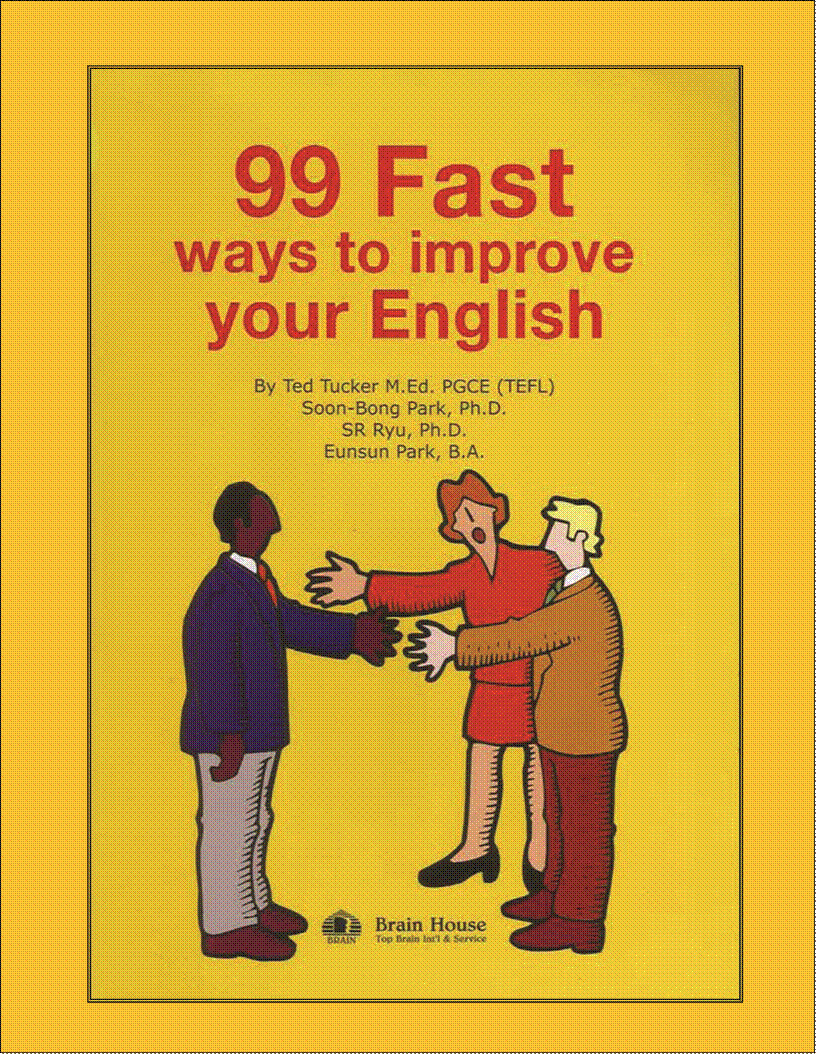
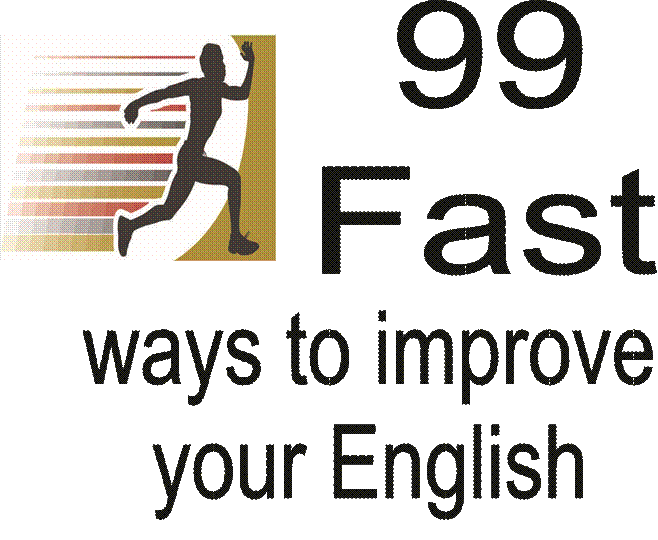 99 Fast Ways to Improve your English
99 Fast Ways to Improve your English
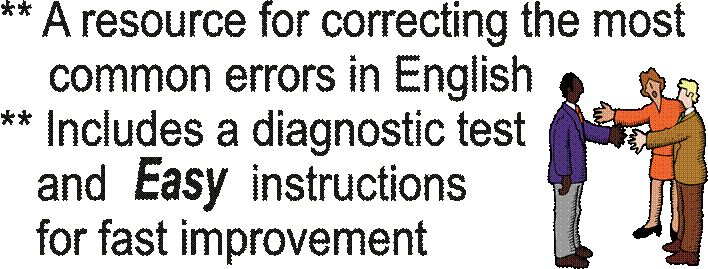
An essential tool for every
![]() student ofAll
Rights Reserved © Engli EFLeBooks sh
student ofAll
Rights Reserved © Engli EFLeBooks sh
All Rights Reserved ©
By Ted Tucker M.Ed. PGCE (TEFL)
with credit to:
S.B. Park, Ph.D. SR Ryu, Ph.D.
Veronica Park, B.Ed.
99 Fast Ways to Improve Your English
is intended to provide students
of English with a useful and easy to use resource.
This book focuses on common mistakes and errors made by students and
provides simple model statements to correct those errors.
 99 Fast Ways to Improve your EnglisINSIDE
99 Fast Ways to Improve your EnglisINSIDE
THIS
E-BOOK
|
Test your knowledge of the most common mistakes in English |
Page Number
5 |
|
Greetings and Farewells |
19 |
|
The most commonly confused words in English |
23 |
|
Wrestling with Grammar |
35 |
|
Misused and Abused Words |
49 |
|
Preposition Power |
65 |
|
Articles Made Easy
|
71 |

The diagnostic test is designed to help you identify specific problems you may have with how you use English.
After you answer the 99 questions, check your answers in the key.
How you do in each section will tell you where to look in the book to improve your specific problems. You may find some questions easy, but it is good to review the basic reasons behind them as well.
Even if you know the correct answer, it is important to be sure that you know WHY it is correct!
Good luck! You are on your way to correcting the most common errors made in English.
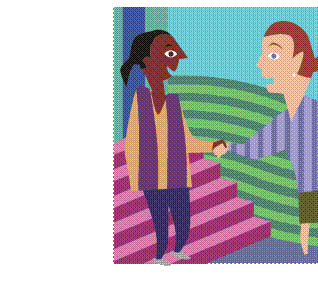
1. Select the best greeting and response.
a. Hello, how are you? Fine, thank you. And you?
b. Hello, how are you? Just fine, and you?
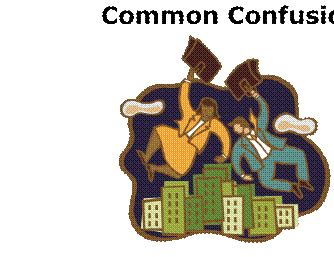
2. You just found out that you won a lottery for $10,000,000!
You might say
a. I’m so exciting!
b. I’m so excited!
All Rights Reserved © EFLeBooks
3. Your boss (or teacher) is talking about something is not interesting to you. You might say a. I’m so boring.
b. I’m so bored.
4. You might ask a friend
a. Will you loan me $5 until tomorrow?
b. Will you borrow me $5 until tomorrow?
5. a. I loaned Y5000 from Mr. Tanaka.
b. I borrowed Y5000 from Mr. Tanaka.
6. a. Most of Koreans like spicy food.
b. Most Koreans like spicy food.
7. a. I’m really tired. I think I’ll lay down for a while.
b. I’m really tired. I think I’ll lie down for a while.
8. a. Your book is lying on the floor.
b. Your book is laying on the floor.
9. a. I learn English every day.
b. I study English every day
10. a. I raise every morning at sunrise.
b. I rise every morning at sunrise.
11. a. They raise the flag every morning at the president’s office.
b. They rise the flag every morning at the president’s office.
12. a. There was a big fight outside a disco last night. The police said the incident should not have happened.
b. There was a big fight outside a disco last night. The police said the accident should not have happened.
13. a. I enjoy looking at movies.
b. I enjoy watching movies.
14. a. I see the newspaper every morning.
b. I look at the newspaper every morning.
15. a. Did you see the accident in front of the gym yesterday?
b. Did you look at the accident in front of the gym yesterday?
16. a. I agree with you. It’s time to go home!
b. I agree to you. It’s time to go home!
17. a. The big boss said he agreed to our demands.
We’ll all get a big raise.
b. The big boss said he agreed with our demands.
We’ll all get a big raise.
18. a. The movie was very impression.
b. That was a very impressive movie.
19. a. I was very impressive with the movie.
b. I was very impressed by the movie.

20. a. He doesn’t English.
b. He doesn’t speak English.
21. a. He can’t speak English.
b. He can’t English.
22. You don’t have a pen I can borrow, do you?
a. Yes, I don’t.
b. No, I don’t.
23. a. You English study?
b. Do you study English?
All
24. a. I slept very well last night because I was tired from studying all day.
b. I very slept last night because I was tired from studying all day.
25. a. She studied very hard last night.
b. She studied very hardly last night.
26. a. I often get up lately if I don’t use my alarm clock.
b. I often get up late if I don’t use my alarm clock.
27. a. He is not enough tall to play basketball.
b. He is not tall enough to play basketball.
28. a. Dr. Kim doesn’t have money enough to buy a Mercedes.
b. Dr. Kim doesn’t have enough money to buy a Mercedes.
29. a. I really love Japanese sumo.
b. I really love Japan sumo.
30. a. The Italian language is easy to learn.
b. The Italy language is easy to learn.
31. Mr. Johnson lives on Phuket Island.
a. There has beautiful beaches.
b. It has beautiful beaches.
32. a. I was married two years ago.
b. I was married two years before
33. a. I was married two years before.
b. I was married two years before I bought an apartment.
34. a. Since it is not raining, I do not need an umbrella.
b. Since it is not raining, I need not an umbrella.
35. a. I wasn't hungry this morning so I have not breakfast.
b. I wasn't hungry this morning so I did not have breakfast.
36. a. Until now women in many parts of the world do not have the same rights as men.
b. Women in many parts of the world do not yet have the same rights as men.
37. a. My boss told me that I had to finish the report until noon.
b. My boss told me that I had to finish the report by noon.
38. a. Miss Ramirez and Miss Choi have the same hair style.
b. Miss Ramirez and Miss Choi have same hair style.
39. a. Bill's car is the same to Fred's car.
b. Bill's car is the same as Fred's car.
40. a. Alice prepared for the English test all night.
b. Alice prepared the English test all night.
41. a. Even if it rains tomorrow I will travel to Prague.
b. Even though it rains tomorrow I will travel to Prague.
42. a. Almost Koreans have black eyes and hair.
b. Most Koreans have black eyes and hair.
43. a. Almost all Chinese have black eyes and hair.
b. Almost Chinese have black eyes and hair.
Misused and Abused Words
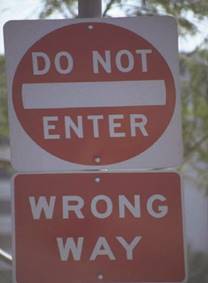
44. a. I received a phone call from my sister-in-law in America.
b. I received a phone from my sister-in-law from America.
45. a. I made a promise to my boyfriend to have dinner with him tonight.
b. I have a promise with my boyfriend tonight to have dinner.
46. a. I respect my parents so I always listen to their saying.
b. I respect m parents so I always listen to what they say.
47. a. He has been dead for three years.
b. He's dead about three years ago.
48. a. My vacation is next month.
b. My holiday is next month.
49. a. My days off are Saturday and Sunday.
b. My holiday is Saturday and Sunday.
50. If the speaker is at school
a. I will come home right after class.
b. I will go home right after class.
51. a. After work today, I will play with my friends.
b. After work today, I will go singing and drinking with my friends.
52. a. I will go bowling tomorrow.
b. I will play bowling tomorrow.
53. a. I live at Hyundae Apartments, number 309.
b. I live at Hyundae Apart, number 309.
54. a. I have many fond remembrances from my childhood.
b. I have many fond memories of my childhood.
55. a. I have to meet my professor at three hour.
b. I have to meet my professor at three o'clock.
56. a. I learn 20 new vocabularies a day.
b. I learn 20 new words a day.
57. a. My girlfriend and I often go window shopping on the weekend.
b. My girlfriend and I often go eye shopping on the weekend.
58. a. My brother is a salaryman.
b. My brother is a lawyer.
59. a. The clothes she has on are very beautiful.
b. The wear she has on is very beautiful.
60. a. Wilcox is famous for its delicious apples.
b. Wilcox is well-known for its delicious apples.
61. a. I took a travel to Beijing last summer.
b. I took a trip to Beijing last year.
62. a. I want to trip to Europe after I graduate.
b. I want to travel to Europe after I graduate.
63. a. Traffic accidents are very common in India.
b. Traffic accidents are very popular in India.
64.a. I would like to introduce my English professor, Mr. Jim.
b. I would like to introduce my English professor,
Mr. Heard.
65. a. She was offered an opportunity to take a great job in
Paris, but she denied to take it.
b. She was offered an opportunity to take a great job in Paris, but she refused to take it.
66. a. Some people say he gambles away all of his earnings but he refuses it.
b. Some people say he gambles away all of his earnings but he denies it.
67. a. Maybe I think I will become a reporter after I graduate from the university.
b. I think I will become a reporter after I graduate from the university.
68. a. I no longer sleep in the same room as my male room mate because he snores too loudly.
b. I stopped sleeping with my male room mate because he snores too loudly.
69. a. Olga majored political science.
b. Olga majored in political science.
70. a. This morning I started making breakfast at 6:30.
b. Today morning I started making breakfast at 6:30.
Preposition Power

71. We all sleep late _____ a holiday.
a. on
b. at
72. We should meet _____ your house.
a. in
b. at
73. Hurry up and get _____ the bus before it leaves!
a. on
b. in
74. Hurry up and get _____ the car so we can get to school on time.
a. on
b. in
75. The last time I saw the rabbit out here, he was hopping _____ your house!
a. in
b. into
76. Let’s go to Walmart _____ the weekend.
a. at
b. on
77. Dr. Omar was born _____ 1976.
a. in
b. on
78. My birthday is _____ July.
a. on
b. in
79. My birthday is _____ July 7th.
a. on
b. in
80. My birthday is _____ Monday, July 7th.
a. on
b. in
81. My house is _____ Columbus Road.
a. on
b. at
82. I live _____ 4255 East 23rd Street.
a. on
b. at
83. Let’s keep this a secret _____ you and me, okay?
a. between
Articles Made Easy
84.
 I had __________ this morning.
I had __________ this morning.
a. a breakfast
b. breakfast
All Rights Reserved © EFLeBooks
85. I am from __________.
a. the Columbo
b. Columbo
86. That is ______car.
a. a my
b. my
87. _______ is my favorite sport.
a. basketball
b. the basketball
88. When she broke her arm, they had to take _____ x-ray.
a. an
b. a
89. The professor gave her _______ to miss class.
a. permission
b. a permission
90. I bought _______ desk today.
a. a one
b. one
91. I saw _______ at your house yesterday
a. a policeman
b. policeman
92. What _______ horse race!
a. exciting
b. an exciting
93. I have _______.
a. cold
b. a cold
94. _______ are smarter than dogs
a. The cats
b. cats
95. We can’t live without _______ to breathe.
a. the air
b. air
96. _______ are always a bad day at work.
a. The Mondays
b. Mondays
97. _______ language is tonal.
a. Chinese
b. The Chinese
98. _______ I live in is very small.
a. House
b. The house
99. I took a vacation in __________.
a. Rocky Mountains
b. the Rocky Mountains
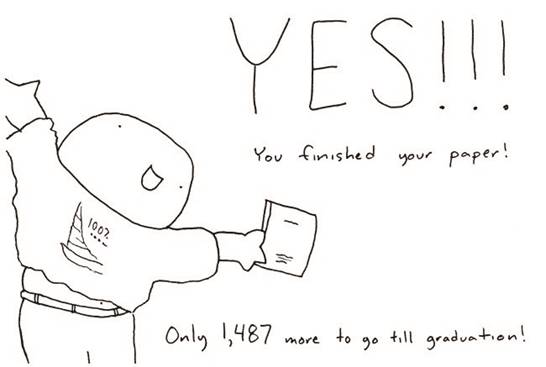
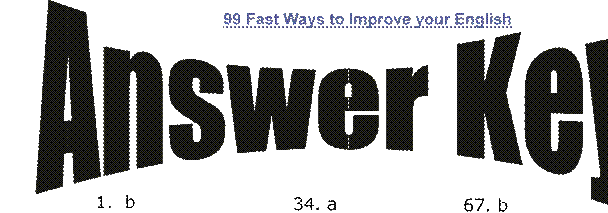
|
2. b 3. b 4. a 5. b 6. b 7. b 8. a 9. b 10. b 11. a 12. a 13. b 14. b 15. a or b 16. a 17. a 18. b 19. b 20. b 21. a 22. b 23. b 24. a 25. a 26. b 27. b 28. b 29. a 30. a 31. b 32. a 33. b |
35. b 36. b 37. b 38. a 39. b 40. a 41. a 42. b 43. a 44. a 45. a 46. b 47. a 48. a 49. a 50. b 51. b 52. a 53. a 54. b 55. b 56. b 57. a 58. b 59. a 60. a 61. b 62. b 63. a 64. b 65. b 66. b |
68. a 69. b 70. a 71. a 72. b 73. a 74. b 75. b 76. b 77. a 78. b 79. a 80. a 81. a 82. b 83. a 84. b 85. b 86. b 87. a 88. a 89 .a 90. b 91. a 92. b 93. b 94. b 95. b 96. b 97. b 98. b 99. b |
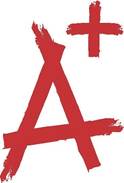 How did you do?
How did you do?
Record your scores for each section below.
Concentrate your studies in the areas where you have the lowest percentage of questions correct.
Greetings: ______
Common Confusion: _____
Grammar: _____
Misused and Abused: _____
Propositions: _____
Articles: _____
Notes:
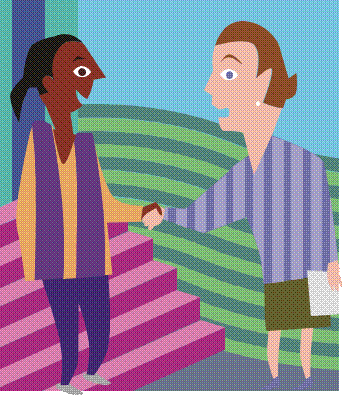
Part One:
Greetings and
Farewells
FOR NATURAL
SOUNDING CONVERSATION:
The fastest way to improve
your English usage is to not use mechanical or memorized phrases for your greetings and farewells.
Most students have memorized one or two basic greetings and use them too often. Some of the greetings that are taught to young students are stiff and unnatural. In particular the tried and true, and very tired, “Fine, thank you, and you?”
Most native speakers will immediately adjust their language to what they guess is your English skill level based only on your initial greetings and responses.
If you greet them with a mechanical and unnatural greeting, they may give you a very simple response and most likely won’t be very responsive - as they will assume that your skill level is low and that it will be difficult to communicate with you.
Don’t let them under-rate you based on a poor first impression.

A: Good morning, how are you?
B: I’m fine thank you, and you?
Try a more flexible set of initial greetings such as:
A: Good morning, how are you today?
A: Good afternoon, how are you doing today?
A: Good evening, how are you doing?
A: How do you do?
Your responses can be even more flexible and demonstrate warmth and friendliness.
B: I’m doing very well, how about you?
B: Great! How are you doing today?
B: Just fine, and you?
B: I’m okay, how about you?
Though often popularized on television and movies, avoid overly familiar and casual greetings unless you are talking to close friends.
Examples:
A: Yo!
A: Howdy!
A: What’s up?
A: How’s it going?
A: What’s happening?

Appropriate Farewells:
These farewells are appropriate in a business setting or when leaving people other than close friends.
A: Good bye.
A: It was nice to see you again.
A: Good evening/night.
A: Have a good evening/day/night.
Casual Farewells:
Use these farewells only when leaving close friends.
A: See you later.
A: Take it easy A: Bye-bye.
“See you again” though common throughout Asia, is not commonly used among native speakers.
Notes for Part One:
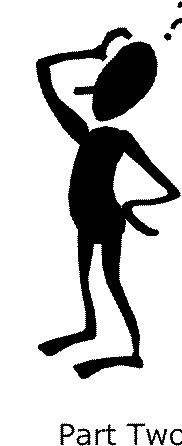
Common Confusion
Some of the most common errors in usage are between certain sets of words. Master these ten sets and you will have made a great improvement!
These participial adjectives create problems for most students of English. The easiest way to remember them is that the –ed form represents the feeling one has, and the –ing form represents what has caused the feeling.
Don’t say: I am so boring.
Do say: The movie was boring. I am bored.

Don’t say: I am so interesting.
Do say: The history of Asia is very interesting.
I am very interested in it.
Yes, you may be very interesting, but you should leave that up to people that know you and who are interested in you.
Many teachers are boring and their students are bored. Sometimes a teacher is bored by his or her students.
You may be an exciting person, but as with “interesting”, we might best leave that to other people to decide!
This trio of words are regularly confused by students and, as a result, frequently used incorrectly.

Loan can be a noun as the name of a transaction where someone borrows something from someone who lends it to them.
It can also be a verb with a meaning similar to that of lend.
Lend and borrow are both verbs.
If I lend something to you (money?), I give it to you temporarily—expecting that you will return it.
If I borrow something from you, I take it from you temporarily, knowing that you expect me to return it to you. I get or receive something from you.
Don’t say: Ramona, will you borrow me 20 pesos?
Do say: Ramona, will you lend (or loan) me 20 pesos so I can buy lunch today?
She might say: Of course, I will be glad to lend (or loan) you
20 pesos! or
Don’t say: Su-Hyun, may I lend 5000 won from you?
Do say: Su-Hyun, may I borrow 5000 won from you so I can buy lunch today?
She might say: Of course, I will be glad to lend (or loan) you 5000 won!
Just as common:
Do say: Can I borrow your cell phone for a moment? I need to call home.
Do say: Would you lend (or loan) your cell phone to me for a moment? I need to call home.
Note that I borrow something from you, but you lend something to me. Or, I may lend something to you, but you borrow something from me. Remember: lend to, borrow from
Using loan as a noun:
Do say: Jacque’s loan (not lend) was for 50 francs.
Students often confuse the use of most and most of. Most should be used if the word following it is a noun or adjective. Most of should be used if the word following it is a pronoun, a proper noun used as a possessive, or an article.
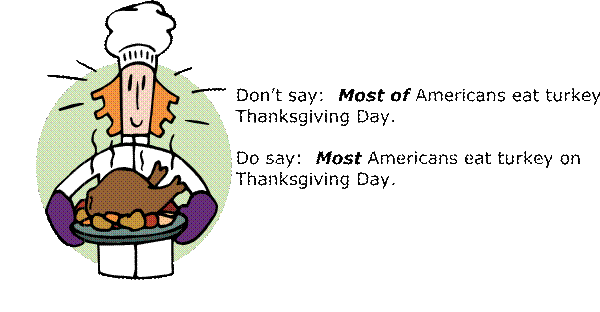
Don’t say: Most Mr. Kim’s students hate to study English.
Do say: Most of Mr. Kim's students hate to study English.

Even some native speakers have trouble with these two words—learn them well and you will be a super star!
Lie is an intransitive verb and never has an object. It means to stay at rest in a horizontal position.
Don’t say: I am going to lay down for a nap.
Do say: I am going to lie down for a nap.
Lay is a transitive verb and always requires an object. It means to set or put something down.
Don’t say: Please lie this book on the desk.
Do say: Please lay this book on the desk.

Students of English often reverse the meanings of these two words.
Learn means to gain knowledge or understanding of something by studying or by experience. Study can be a noun, when it means to use your mental power to learn about (to understand) something, or a verb when it means the act of studying.
Examples:
Don’t say: I learn English every day.
Do say: I study English every day.
This means I sit down and read my books, listen to tapes and practice hoping to understand it.
Don’t say: I hope to study English well.
 Do say: I hope to learn
English well.
Do say: I hope to learn
English well.
This means I hope that I will understand and use the language well because my understanding of it is good.
These two words, like lie and lay, are often misused, even by native speakers—you can get the upper hand by understanding them.
Raise means to lift up something.
Don’t say: We rise the flag everyday at the student assembly.
Do say: We raise the flag everyday at the student assembly.
Rise means to go up, stand up, or get out of bed.
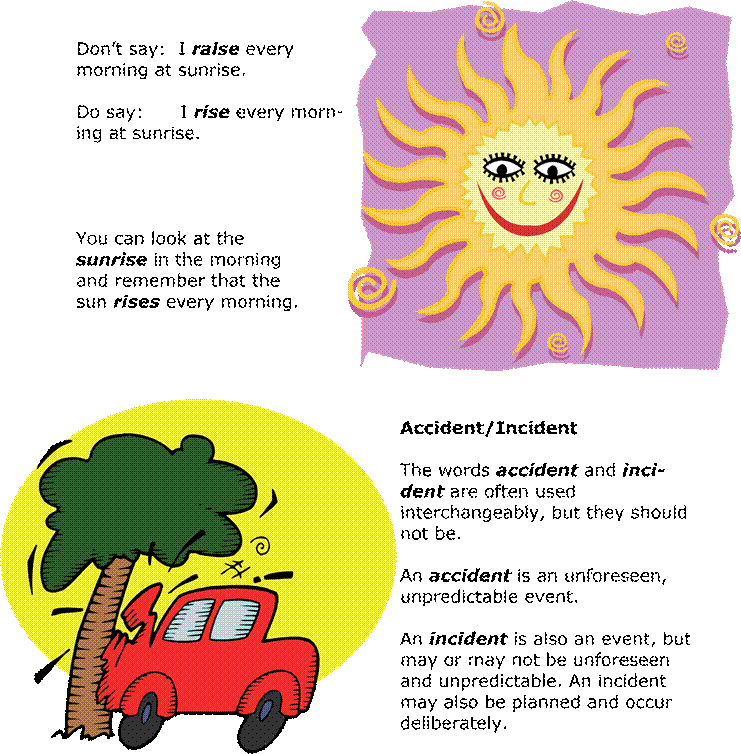
Don’t say: A man murdered his parents last night in order to gain access to their money. This kind of accident is deplor able and has shocked the entire nation. (If a man plans a murder it is not an accident, it is an incident.)
Do say: This kind of incident is deplorable and has shocked the entire nation.

These terms are often used incorrectly by students of English.
Use see when you mean to perceive something with the eyes.
Use look at when you mean to use your eyes to see something. Often the thing or things you are viewing does not move or is stationary (such as a painting or photographs)
Use watch when the thing you are viewing is moving or changes (such as television or a movie).

Don’t say: Whenever I smoke, my wife sees me with disgust.
Do say: Whenever I smoke, my wife looks at me with disgust.
Don’t say: Did you look at what just happened?
Do say: Did you see what just happened?
Don’t say: I looked at TV until 11:00 PM last night.
Do say: I watched TV until 11:00 PM last night.
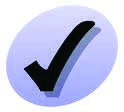 Agree with/Agree to
Agree with/Agree to
These terms are often a problem for students of English.
Use agree with if you have the same opinion, idea, judgment, etc. as another person.
One agrees with people.
Don’t say: Miss Lee agreed to Mr. Ma's comment about the educational problems in Taiwan.
Do say: Miss Lee agreed with Mr. Ma's comment about the educational problems in Taiwan.
Use agree to if you concur with the actions, plans, suggestions of another person. One agrees to things.
Don’t say: Bill agreed with his brother's suggestion to lend him money to start his own business.
Do say: Bill agreed to his brother’s suggestion to lend him money to start his own business.
 Many students use the
wrong form of the word impress.
Many students use the
wrong form of the word impress.
Impressive is an adjective and modifies a noun or pronoun.
Impressively is an adverb and modifies a verb.
Don’t say: The movie was very impression.
Do say: That was a very impressive movie.
(adjective)
Do say: He acted very impressively in the movie. (adverb) Impression is a noun and is used to describe a positive influence that something or someone has made on another.

Don’t say: That movie made me impressed.
Do say: That movie made an impression on me.
Impressed is a verb and is used to indicate that something or someone has had a positive influence on someone.
Don’t say: I was very impressive with the movie.
Do say: I was very impressed by the movie.
Go to the exercises on the next page ► ► ►

Try these exercises to see if you learned everything from Part Two!
(The answers are upside down on the bottom of the page)
_______1. ________ students don’t like too much homework!
a. Most of b. Most
_______2. Will you _______ me W5000 until tomorrow?
a. loan b. borrow
_______3. My English professor is so _______.
a. boring b. bored
_______4. Did you see the car _______ in front of the school?
a. incident b. accident
_______5. Did you _______that movie last night? Wow!
a. look at b. watch c. see
_______6. I don’t _______ Dr. Park about my test scores.
a. agree with b. agree to
_______7. Please _______ down and rest. You look exhausted!
a. lie b. lay
_______8. What time did you _______ this morning?
a. rise b. raise
_______9. Dr. Piquet’s lecture was very _______.
a. impression b. impressively c. impressive
![]()
Notes for Confusing Words:
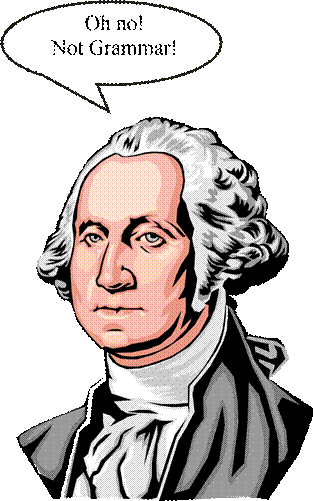 Part Three:
Part Three:
Wrestling with
Grammar
Though students often have a good grasp of grammar, when they speak they frequently make errors that are inconsistent with their knowledge.
Following are some corrections you can make to improve your speech.
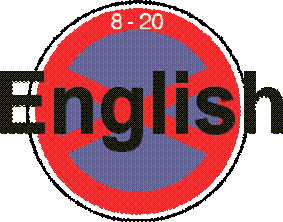 Students of English
often forget to include a main verb when making negative statements.
Students of English
often forget to include a main verb when making negative statements.
Don’t say: He doesn’t English.
Do say: He doesn’t speak English.
Don’t say: He can’t English.
Do say: He can’t speak English.
Many students answer questions which have negatives in them incorrectly if the answer is no.
If the question is answered yes - and the person means no, it will confuse native speakers of English.

Students of English often respond by saying yes, meaning that they agree with the statement or question. Native speakers respond with no as if the negative were not in the question.
Question: You didn't buy another new shirt?
Don’t say: Yes, I decided not to because I couldn't find one I liked. Do say: No, I didn't because I couldn't find one I liked.
The word order in English is subject, verb, object. Many students confuse English word order with the different word order of their own first language. Be careful to use the SVO form.
Don’t say: You English study? (SOV)
Do say: Do you study English? (SVO)
Don’t say: You door close. (SOV)
Do say: (You) Close the door. (SVO) You, the subject, is understood and does not need to be stated here.
 HE/SHE
HE/SHE
Many students forget to keep the gender consistent (and correct) when they are speaking and using gender-specific pronouns.
Speaking of a male student:
Don’t say: She studied all night.
Do say: He studied all night.
Be sure to keep the gender consistently male or female when continuing to speak of a specific person.
The word very, when used to give force or emphasis to the degree that something happens, should modify another adverb, not the verb.
Don’t say: I very slept last night because I was tired from studying all day.
Do say: I slept very well last night because I was tired from studying all day.
The words hardly and lately are sometimes used as adverbs incorrectly. Students of English often follow the general rule of adding an –ly suffix to the adjective to form the adverb. This rule does not apply to the words hard and late. They are irregular adverbs.
Don’t say: Her supervisor makes her work very hardly.
Do say: Her supervisor makes her work very hard.
Don’t say: I often get up lately if I don't set my alarm clock. Do say: I often get up late if I don't set my alarm clock.
Students of English often place the word enough in the wrong place in a sentence. Enough should be placed before nouns, pronouns, or gerunds.
Don’t say: He doesn’t have money enough for a new car.
Do say: He doesn’t have enough money for a new car.
Enough should be placed after adjectives and adverbs.
![]() Don’t say: He is not enough
tall to play basketball.
Don’t say: He is not enough
tall to play basketball.
Do say: He is not tall enough to play basketball.
There are, however, three common exceptions to the rule:
There isn’t time enough (to do something.
That isn’t reason enough (to do or justify something).
and
(Someone) isn’t fool enough (to do something).
When describing a country's language or products, nouns are often used when the speaker should use the adjective form of the word.
Don’t say: Yesterday, I bought a Japan TV.
Do say: Yesterday, I bought a Japanese TV.
Don’t say: The Germany language is very difficult to learn. Do say: The German language is very difficult to learn.
When referring to a place, such as a city, many people use the word there as a pronoun and the correct pronoun should be it.

Students of English often make errors in the use of in and ago when they are talking about the past or future - when the reference point in time is now (at this moment).
When the reference point in time is now and you are talking about something in the past use ago. He quit smoking five years ago.
When the reference in time is now and you are talking about something in the future use in. I will quit smoking in two days.
Don’t say: I graduated from university two years before.
Do say: I graduated from university two years ago.
Do say: I will graduate from university in two years.
While and during are both used to talk about two events that occur at the same time. While should be used before adverbial phrases and during should be used before nouns or noun phrases.
Don’t say: While our vacation we traveled to twelve European countries.
Do say: During our vacation we traveled to twelve European countries.
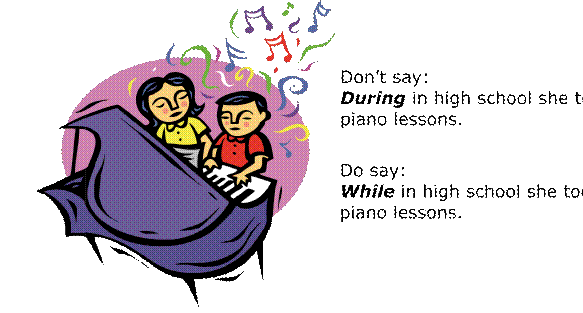
Frequently students of English forget to use the auxiliary verb do in negative sentences.
Don’t say: Since it is not raining I need not an umbrella.
Do say: Since it is not raining I do not need an umbrella.
Don’t say: I wasn't hungry this morning so I have not breakfast.
Do say: I wasn't hungry this morning so I did not have breakfast.
Do say: I don’t own a car.
Students often mistakenly use until now when they should use still or yet.
Still indicates that a situation in the past continues to the present. He still tells funny jokes all the time!
![]() However, yet
indicates that something has not happened. He hasn’t gotten married yet.
However, yet
indicates that something has not happened. He hasn’t gotten married yet.
Don’t say:
In America, men having long hair is very common among college students until now, just like it was in the 1960's.
Do say:
In America, men having long hair is still very common among college students, just like it was in the 1960's.
Learners of English are often confused about the difference between the words until and by when using these words for time reference.
Until means that something occurred up until a specific time and then stopped.
Example: You have until Friday to prepare for the test.
Or something did not happen until a specific time—and could only happen after that time.
Example: You cannot take the test until Friday.
By means at or before a specific time.
Example: You must use that airplane ticket by August 15th.
(indicating only that it must be used)
![]() Also correct: You
have until August, 2006 to use that airplane ticket. (indicating
that something will change—but what will change
Also correct: You
have until August, 2006 to use that airplane ticket. (indicating
that something will change—but what will change
is not specified.)
Don’t say:
My boss told me that I had to turn in the report until noon.
Do say:
My boss told me that I had to turn in the report by noon.
(It must be finished by then.)
Do say:
My boss told me that I had until noon to turn in the report.
(He won’t want it after noon, or I am in trouble if I turn it in after that time!)
Students often forget to include the in the phrases the same and the same as.
Similarly, errors are made when English students use the phrases the same with and the same to. These two are not English terms.
![]()
The same or the same as should always be used when talking about two things being very similar or identical.
Don’t say: Mr. Chen and Miss Lee have same kind of car.
Do say: Mr. Chen and Miss Lee have the same kind of car.

Don’t say: Bill's car is the same to Fred's car. Do say: Bill's car is the same as Fred's car.
Prepare means to make ready for use.
We’d better prepare your parachute for your first jump.
Prepare(d) for means to get ready to do something.
I’m prepared for the first parachute jump. Everything is ready.
Don’t say: Alice prepared the English test all night.
This sentence means that Alice made or wrote the test for the other students to take.
Do say: Alice prepared for the English test all night. This sentence means that Alice studied for the test.
Students frequently have problems with the use of even if and even though.
Even if should be used when the situation being talked about does not exist.
Even though should be used when the condition being referred to already exists.

Don’t say: Even if Taiwan is a small country, it has many beautiful sights.
Do say: Even though Taiwan is a small country, it has many beautiful sights.
Sometimes there is confusion between the words most and almost. Most if you mean to say nearly all or a majority of a group. Almost means very nearly but not quite all.
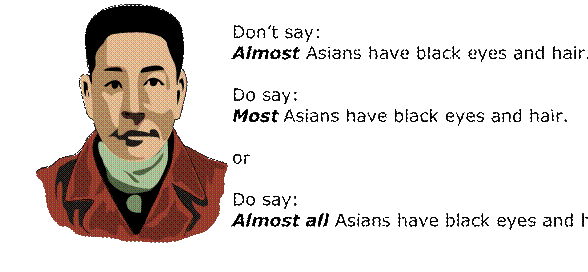
These two verbs create problems for most students as much of the usage is idiomatic and requires you to memorize it—rather than to understand and reason out the use.
Make functions as a main verb. Make in its more literal sense is generally used to refer to building, constructing, producing or creating something. That something can be abstract as well as concrete, for example: make a decision, make an agreement.
Do can function as a main verb or as an auxiliary verb. Do is used to describe an action without saying exactly what the action is, or to talk about work and jobs. Examples include: do something crazy, do me a favor.
Following is a list of some common (and idiomatic) uses:
MAKE Do
make a decision do a lesson make dinner do a math problem make the bed do one’s best make a mistake do a favor make a promise do homework make noise do business make fun of do away with
make progress do exercises make an excuse do the shopping make a speech do it myself make arrangements do the accounts make a profit do it in good time make a call do things around the house make enquiries do your job make a dress do over 200 kilometers an hour
make an effort do it now
make something of myself do well
make a complaint do harm make a demand do badly make love do your part
make money do it in good time
make an offer
make an exception make a suggestion make an objection make a phone call make an agreement
![]() Don’t say: I’m going
to make my homework tonight.
Don’t say: I’m going
to make my homework tonight.
Do say: I’m going to do my homework tonight.
Don’t say: I did a big mistake on the test yesterday.
Do say: I made a big mistake on the test yesterday.
Many students of English speak using primarily simple present verbs or base-form verbs. They have particular problems with inflected verbs with the added –s and –ed endings. These endings are often either pronounced so softly as to be indistinguishable or dropped altogether.
![]() Make a special effort
to use the proper verb
Make a special effort
to use the proper verb
(with the proper ending!) and pronounce it
Don’t say: He walk to school every day.
Do say: He walks to school every day. (note the –s)
Don’t say: He want to buy a car yesterday.
Do say: He wanted to buy a car yesterday. (note the –ed)


Try these exercises to see if you learned everything from Part Three!
(The answers are upside down on the bottom of the page)
_______1. You don’t have a pen I can borrow, do you?
a. Yes, I don’t. b. No, I don’t.
_______2. I _____________ last night.
a. studied very hard b. very studied
_______3. He’s not ________ to buy that expensive Mercedes.
a. enough rich b. rich enough
_______4. I just got a new ________ watch. Seiko! Very nice.
a. Japanese b. Japan
_______5. Kwak and Kim got married two years _______.
a. ago b. before
_______6. _______ I was watching the movie, I got scared.
a. During b. While
_______7. He _______ English.
a. doesn’t b. doesn’t speak
_______8. His university grades are the _______ as his sister’s.
a. the same as b. same as
_______9. _______ I was rich, I wouldn’t buy a BMW. a. Even though b. Even if
______10. I need to go home now and _______ my homework.
a. do b. make
![]()
![]()
Part Four:
Misused and Abused Words
Students of English often learn to use certain words incorrectly. The words and terms that follow are specific to EFL students and are often used inappropriately or sometimes are attributable to a mixture of English and another language (and not really correct in either language!).
When talking about receiving telephone messages, the word call in the phrase phone call is often left out, which completely changes the meaning of the sentence.
Don’t say: I received a phone from my sister-in-law from America. This sentence means that you were given a telephone as a gift.
Do say: I received a phone call from my sister-in-law in America.
The use of the word promise is frequently used incorrectly as a noun, when it should be used as a verb, or vice versa.
The use of promise as a noun is an agreement to do something for someone, usually specifying what the agreement is.
The use of promise as a verb indicates that an agreement was made.
![]()
Don’t say: I have a promise with my boyfriend tonight to have dinner.
Do say: I made a promise to my boyfriend to have dinner with him
tonight. (used as a noun)
Do say: I promised my boyfriend that I would have dinner with him
tonight. (used as a verb)
The word saying is frequently misused by students of English to mean something that someone has said. English speakers use saying to refer to famous quote or a well-known statement.
Don’t say: I respect my grandmother because she is wise, therefore I always listen to her saying.
Do say: I respect my grandmother because she is wise, therefore I always listen to what she says. (what she tells me, or what she has to say)
Do say: There is an old saying: "If you can't beat them, join them".
The word dead is used to describe the condition of an individual who is no longer alive. The word die is a verb meaning to stop living. These words are often confused by English students.
Don’t say: He's dead about three years ago.
Do say: He died about three years ago.
Do say: He has been dead for three years.
The words holiday and vacation are frequently used incorrectly.
Holiday refers to a day designated by the government to celebrate or commemorate a special event, such as Christmas or Chinese New Year.
Vacation refers to time off from work that employees earn and are usually from one week to one month in duration. Days off refer to the days that employees do not work during the week. Days off are usually on Saturday and Sunday.
![]()
Don’t say: My holiday is next month.
Do say: My vacation is next month.
Don’t say: My holiday is Saturday and Sunday.
Do say: My days off are
Saturday and Sunday.
![]()
In English, the terms boyfriend and girlfriend usually means or implies lover. If a man says that he is going to the movies with his boy friend, a native speaker may think that the person is gay or homosexual. You may not want to give the listener the wrong impression. You can simply say friend. The same is true when a woman uses the term girlfriend when speaking of a friend.
Don’t say (female): I’m going out to dinner with my girlfriend.
Do say: I’m going out to dinner with a friend.
Use come if you are at a place and are talking about that place as your destination.

Use go if you are at one place and are talking about another place as your destination.
A person in the classroom might say:
Don’t say: I will come home right after class. Do say: I will go home right after class.
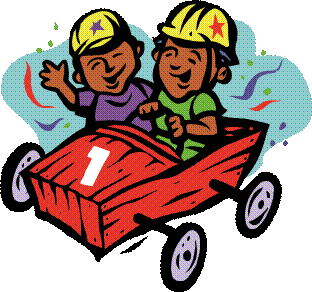
The word play is used when talking about games or sports that require at least two people (or a team) to participate in. It is not used when talking about a game or sport if only one individual can participate (or where a person is competing against themselves). Other examples of such sports are swimming, running, camping, etc.
Don’t say: I will play bowling tomorrow. Do say: I will go bowling tomorrow.
Another problem with play is that it is often used by students to describe activities in which they engage with friends. For most English speakers play is what young children do with their friends when they play with dolls or cars and trucks, or go riding their bicycles, etc.
Adults should name the activities in which they will engage.
Don’t say: Tonight I am going to play with my friends.
Do say: Tonight I am going to go drinking and singing with my friends.
In some countries the word apart when used to describe apartment housing is incorrect. The correct English word is apartment(s).
Don’t say: I live at Hyundae Apart, number 309.
Do say: I live at Hyundae Apartments, number 309.
Do say: My apartment is on the other side of town.
The word remembrance is often used incorrectly. Usually the correct word should be memory.
The word remembrance is used to refer to an object that reminds us about memories from the past.
In this context, the word memory is used when referring to recalling times and situations, or things from the past.
Don’t say: I have many fond remembrances from my childhood.
Do say: I have many fond memories of my childhood.
Do say: I keep a doll on my bed that my grandmother gave me as a remembrance of my childhood.
Of course should be used when referring to something that could be considered obvious to almost every one. It is often used inappropriately to mean an affirmation of something, even when that something may not be obvious.
Don’t say:
Paul: Do you live in Berlin?
Marcus: Of course, I'm German.
Do say:
Paul: Do all Germans living in Berlin speak the German language?
Marcus: Of course! What else would they speak?
![]()
The word hour is frequently used incorrectly, when the speaker actually means o'clock.
Hour is used to indicate the duration of something.
O'clock is used to indicate a specific time of day.
Don’t say: I have to meet my professor at three hour.
Do say: I have to meet my professor at three o'clock.
Do say: I have to meet my professor for an hour at three o'clock.
Vocabulary is often used incorrectly when the speaker should say words. A word is a member (or part ) of a larger vocabulary. A vocabulary is the total words known by a speaker or total words in a language.
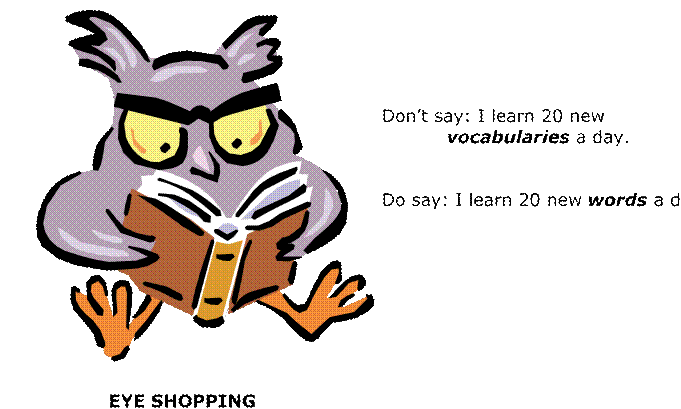
While a wonderful term in itself, English speakers have no idea what eye shopping means. Window shopping is the term that native speakers would use.
![]()
Don’t say: My girlfriend and I often go eye shopping on the weekend.
Do say: My girlfriend and I often go window shopping on the weekend.
The use of the term salaryman or its equivalent by many Asians to describe an occupation is very vague and means nothing to a native speaker. There are countless jobs that receive salaries: doctors, lawyers, accountants, directors, janitors, school teachers, etc.
One should specifically state the job or field if one is employed by a large company. For instance: accountant, salesman, marketing director, computer specialist, etc.
Don’t say: My brother is a salaryman.
Do say: My brother is a lawyer.
![]()
The word wear is often incorrectly used to mean clothing or clothes.
Don’t say: The wear she has on is very beautiful.
Do say: The clothes she has on are very beautiful.
Many students use famous when they should use the term wellknown.
![]() While these two terms
can be usually be considered synonyms, famous has in its
definition that something is famous because of an achievement of
some sort.
While these two terms
can be usually be considered synonyms, famous has in its
definition that something is famous because of an achievement of
some sort.
Something that is famous could also be said to be better-known and more widely-known than something that is just well-known.
Don’t say: Washington state is famous for its delicious apples.
Do say: Washington state is well- known for its delicious apples.
Don’t say: Mexico is famous for its spicy foods.
Do say: Mexico is well-known for its spicy foods.
Trip and travel are frequently used interchangeably and they should not be. Trip is usually used as a noun and travel is usually used as a verb.
Don’t say: I took a travel to Africa last summer.
Do say: I took a trip to Africa last year.
Don’t say: I want to trip to Europe after I graduate.
Do say: I want to travel to Europe after I graduate.
The words common and popular are often incorrectly interchanged by English students.
Popular means to be liked, appreciated, and accepted by many people.
Common means to be prevalent and occurring often. Many common things are not well liked and occur often, but this does not make it popular.
When using the titles of Mr., Mrs., and Miss when addressing people, English speakers use the person’s last name (family name). Asians frequently use a persons first name (given name) and not the family name.
Don’t say: I would like to introduce my English professor, Mr. Jim.
Do say: I would like to introduce my English professor, Mr. Heard.
Students often confuse the meaning of these two words and use them interchangeably.
Refuse is a verb that typically means someone is unwilling to allow, accept, consider, or receive someone or something.
Refuse may imply that someone is determined and may even be mildly rude in their refusal.
Example: When he came to her office, she refused to see him.
Deny is also a verb and usually has the meaning to refuse to admit the existence, truth, or value of something. She denied that her car was worth only £500.
Don’t say: She was offered an opportunity to take a great job in China, but she denied to take it.
Do say: She was offered an opportunity to take a great job in China, but she refused to take it.
Don’t say: Some people say he gambles away all of his earnings. But he refuses it.
Do say: Some people say he gambles away all of his earnings.
But he denies it.
A common expression used by many students is maybe I think when they are expressing their thoughts about something.
The problem is that maybe expresses uncertainty, so using it with I think suggests that the speaker is not sure whether he thinks (or believes) what he is saying.
Don’t say: Maybe I think I will become a reporter after I graduate from university.
Do say: I think I will become a reporter after I graduate from university.
or,
Do say: Maybe I will become a reporter after I graduate from university.
For English speakers the expression sleeping with usually means two people are having sex together. Using this expression incorrectly could give the listener the wrong impression and embarrass the speaker.
Don’t say: I stopped sleeping with my male room mate because he snores too loudly. This sentence implies that the two people were in a sexual relationship, which may not be the intent of the speaker.
Do say: I no longer sleep in the same room as my male room mate because he snores too loudly.
The word major, when used to mean the subject that one studies in college, is frequently used incorrectly.
When used as a verb, the word major requires the preposition in.
When used as a noun, the word major often requires a possessive noun or pronoun. Also major is only used in referring to students, not graduates.
If referring to graduates the past tense must be used.
Don’t say: Miss Suda majored political science.
Do say: Miss Suda majored in political science.
Do say: Mr. Grey's major is chemistry.
A common error is to use the word today with morning, afternoon, or night when talking about things that happen on the same day that the speaker is speaking.
When using morning, afternoon, and night it is implied that the speaker is talking about the same day. Using the word today in this situation is redundant. Instead, use this (this morning, this afternoon, this evening).
If you are referring to other days, use yesterday, tomorrow, the day after tomorrow, etc.


Try these exercises to see if you learned everything in this section!
(The answers are upside down on the bottom of the page)
_______1. My regular _______ are Saturday and Sunday.
a. holiday b. days off
_______2. Last night I _______ with my friends.
a. played b. went singing
_______3. My class starts at nine _______.
a. o’clock b. hour
_______4. Mr. Jang is a _______.
a. salaryman b. businessman
_______5. I _______ English Literature at university.
a. majored b. majored in
_______6. _______ afternoon I’m going to go to the cinema.
a. Today b. This
_______7. Dr. Em is a wise man, I always listen to _______.
a. his saying b. what he says
_______8. I _______ my mother that I would get an A in English. a. have a promise to b. promised
_______9. I have many great _______ of my grandmother. a. remembrances b. memories
______10. Let’s go downtown and go _______.
a. eye shopping b. window shopping
![]()
Part Five: Preposition Power
Most students of English understand the basics of prepositions but have difficulty with the broader range of prepositions once their vocabulary grows. Sharpen your use of prepositions in this section and your skill level will move up a couple notches.
Try this basic set of questions then look at the review on the following pages. Put a preposition in each blank or an “X” if the blank doesn’t need a preposition! The answers are at the end of the exercise.
1. I go shopping _____ the weekends.
2. My Business Law class is _____ 8 pm every Monday.
3. My company moved _____ Seoul _____ Pusan _____ 2001.
4. Skiing is my favorite activity _____ every winter.
5. Mr. Lee’s dog ran away _____ last night.
6. He likes to get up early _____ the morning.
7. _____ June 3rd we will all take a day off.
8. We all sleep late _____ a holiday.
9. _____ the weekends I like to take a nap _____ midday.
10. Mr. Savalas got married _____ a week ago.
11. Let’s meet _____ Wednesday evening and have dinner together.
12. Most of us don’t like to go outside _____ the summer.
13. Ms. Bila’s car broke down and she had to walk home _____ last night.
14. She is usually home and sleeping _____ midnight.
15. None of the students study _____ Saturday evenings.
16. I never go to work _____ Christmas Day.
17. I didn’t do anything _____ last weekend.
18. My family lives _____ the Samsung Apartments _____ Youngsan Dong _____ Seoul.
19. We used to live _____ Chungcheonbuk-do province, but now we live _____ Cheju Island.
20. I live ______ 2233 East 23rd Street.
21. Please get _____ the car so we can go!
22. Did he get _____ the bus yet?
23. Let’s finish this work _____ noon so we can go to lunch.
24. I used to live _____ the ground floor of my building but I moved up to the fifth floor.
25. I hate standing _____ line _____ a supermarket.
26. _____ vacation I like to lie _____ the beach and swim _____ the sea.
27. I want to take my next vacation _____ China.
28. Let’s go _____ the hospital _____ next week to visit Mr. Park.
29. I was born _____ 8 pm _____ November 9th _____ 1976.
30. You can find the answers to this quiz _____ the bottom of this page.
Answers to the Exercise
1. on 2. at 3. to/from, from/to, in 4. X 5. X 6. in 7. on 8. on 9. on,at
10. X 11. on 12. in 13. X 14. by/at 15. on 16. on 17. X 18. in, in, in 19. in, on 20. at 21. in 22. on 23. at/by 24. on 25. in, at 26. on, on, in 27.
in 28. to, X 29. at, on, in 30 at/on
Prepositions of Time Prepositions of Time
|
At used with exact time |
a specific time (at midnight) a time (at lunch time, at noon) night sunrise, sunset, dawn, dusk
|
|
In used with a period of time
|
the morning the evening the afternoon a month (in February) a season (in the winter) a year (in 2005) an amount of time (in two weeks, in two years, in two minutes)
|
|
On used with day and dates
|
a day (on Monday) a specific day (on Christmas Day) a date (June 3rd, 2004)
|
|
No Preposition |
every day, week, year (every Wednesday) every time (every ten minutes) last year a week, a year ago ten minutes ago
|
|
For |
an amount of time (for ten minutes, for ten years)
|
|
Since All Rig |
a specific time
|
Prepositions of Place
|
To/From used to movement from one place to another (or direction)
|
I drive to the gym every day. I walk to class in the morning. Dr. Lee moved from Seoul to Mokpo.
|
|
At used to denote position or rest (at a specific place)
|
He is waiting at the door. He lives at home. We’ll meet at the restaurant.
|
|
In used to denote position or rest inside something
|
The book is in my desk. We took walk in the countryside. |
|
Into denotes movement towards the inside of something
|
Let’s go into the library and study. He drove his car into the garage. |
More Prepositions of Place
Between means something is placed in a position that is mid-point, or inline of two other objects. Among means that something placed within a group of more than two other objects.
![]()
![]() Between
Between
The heart is between the stars. The heart is among the stars.
Between can be used in a more abstract sense:
Let’s keep this secret between us. The secret is the heart, we are the stars in the example above left.
Only the two of us will know the secret. We won’t tell anyone else.
Among can also be used in an abstract sense:
Let’s keep this secret among us.
More than two of us know the secret. We won’t tell anyone else.
Students of English often confuse native speakers of English by using opposite and across from to mean that something is across the street from, but not necessarily exactly opposite the reference point. English speakers will expect that something that is opposite or across from something else will be exactly across the street.

Don’t say: The star is across from (or opposite) the arrow.
Do say: The star is across from (or opposite) the heart.
Do say: The star is across from, but down the street from the arrow.

Try these exercises to see if you learned everything from Part Five! Put the letter of the correct answer in the blank in front of the question number.
The answers are upside down on the bottom of the page.
_______1. Let’s meet _______ the afternoon.
a. on b. in c. at
_______2. Dr. Kwang studied English _______ twenty years.
a. since b. for c. at
_______3. He wants to meet _____ the library at noon.
a. on b. at c. into
_______4. Hyesuk has been studying _______ 3 a.m.
a. for b. since c. at
_______5. We meet _______ every Monday.
a. at b. no preposition c. on
_______6. On Sundays they take a walk ______ the countryside.
a. in b. at c. on
_______7. Ramona usually sleeps _______ noon.
a. until b. by c. since
_______8. It is too cold _______ the winter.
a. in b. no preposition c. since
_______9. Let’s take an airplane trip _______ Hong Kong.
a. to b. into c. over
______10. Our apartment is _______ the fifth floor.
a. on b. in c. into
![]()
Part Six: Articles Made Easy
One of the fastest ways to make your English speech sound more normal is to use articles consistently and correctly. The absence of articles in a student’s speech is a definite sign of the beginner.
Grammar authority Michael Swan, in his book Practical English Usage (Second Edition, Oxford University Press, 1995) tells us that: "The correct use of the articles (a/an and the) is one of the most difficult points in English grammar." So, in this section we will try to make it as simple and as clear as possible.
Collins Cobuild Publishers report that 8.5% of all English communication is the, a, or an. So, if you can improve in this area—a big plus for you!
1. WHEN ARTICLES ARE NOT USED:
Before a common noun in the singular if it is preceded by:
demonstrative terms such as this, that, these or those; possessive adjectives such as his, her, my, their, our or your; or
When referring to: the name of a specific mountain or island; the name of a city, country, continent, or season; and one’s own parents (father or mother); meals (breakfast, lunch, supper, dinner) and sports; the names of diseases, and after phrases such as kind of or sort of, or after whose.
![]() Don’t say: I had
a breakfast this morning.
Don’t say: I had
a breakfast this morning.
Do say: I had breakfast this morning.
Don’t say: I am from the Taipei.
Do say: I am from Taipei.
Don’t say: That is a my car.
Do say: That is my car.
![]() Don’t say: I want the
that pencil. Do say: I want that pencil.
Don’t say: I want the
that pencil. Do say: I want that pencil.
Don’t say: The basketball is my favorite sport.
Do say: Basketball is my favorite sport.
Don’t say: I love the Phuket Island.
Do say: I love Phuket Island.
Note that when a is used, it is used before nouns that begin with a consonant sound. An is used before nouns that begin with a vowel sound. Many students incorrectly say an university or a hour.
Don’t say: They had to take a x-ray of his broken arm.
Do say: They had to take an x-ray of his broken arm.
X-ray begins with a vowel sound and should take the article an.
![]()
2.1 The indefinite article (a/an) is not used before:
uncountable nouns such as advice, furniture, machinery, money and work; nouns such as work, health and permission; plural countable nouns such as dogs and cats; and cardinal numbers (one, two, etc.) that precede nouns.
Don’t say: The professor gave her a permission to miss class. Do say: The professor gave her permission to miss class.
![]() Don’t say: I bought
a furniture for the office today.
Don’t say: I bought
a furniture for the office today.
Do say: I bought furniture for the office today.
Don’t say: I bought a one desk today.
Do say: I bought one desk today.
2.2. The indefinite article (a/an) must be used:
2.2.1. When referring to one specific type of person, place or
thing
![]()
Don’t say: I saw policeman at your house yesterday. Do say: I saw a policeman at your house yesterday.
Don’t say: I saw strange car in front of your house late last night.
Do say: I saw a strange car in front of your house late last night.
![]() 2.2.1. Before the
words trillion, billion, million, thousand, hundred and dozen—if no cardinal
number precedes them
2.2.1. Before the
words trillion, billion, million, thousand, hundred and dozen—if no cardinal
number precedes them
Don’t say: I’d like dozen pencils please.
Do say: I’d like a dozen pencils please.
2.2.2. Before professional titles - if not preceded by a cardinal number.
Don’t say: I’m really sick. I need doctor fast!
Do say: I’m really sick. I need a doctor fast!
Don’t say: I’m in big trouble. I need a ten lawyers fast!
Do say: I’m in big trouble. I need ten lawyers fast!
2.2.3. When referring to a member of a class
Don’t say: Man should serve his country in the army.
![]() Do say: A man
should serve his country in the army.
Do say: A man
should serve his country in the army.
2.2.4. Before exclamations beginning with what
Don’t say: What exciting horse race!
Do say: What an exciting horse race!
2.2.5. Before certain clauses and phrases such as:
It’s a big problem.
It’s a pity.
to keep a secret to have an opportunity to have a plan to make an effort to have an illness (common illnesses, not diseases)
Don’t say: I have cold. Do say: I have a cold.
Don’t say: He made effort to pass the class.
Do say: He made an effort to pass the class.
3.1 The definite article (the) in a general and specific sense:
In general, nouns do not need an article when they are used in a general sense, but if they are used in a specific sense the definite article is needed. Note the inclusion or omission in the following examples:
3.1.1. Plural Nouns
![]()
Life is too short to spend worrying about things. A life not lived to the fullest, is not worth living
Cats are smarter than dogs.
A dog can be a man’s best friend.
3.1.2. Abstract Nouns
Love is the essence of life.
A love such as ours, makes life worth living.
3.1.3. Material Nouns
We can’t live without air to breathe.
The air in Mexico City is really polluted.
3.1.4. Days, Months, Seasons
Mondays are always a bad day at work.
The Monday I was hired was a great day!
3.1.5. Names of Languages
Chinese is really difficult to learn.
The Chinese language is tonal.
3.1.6. Meals
Breakfast is my biggest meal of the day.
The breakfast I had yesterday gave me an upset stomach.
3.1.7. Colors
Green is the color that symbolizes jealousy. The blue in the sea today is beautiful!
3.2. The definite article (the) must always be used before:
3.2.1. Singular countable nouns when there is only one
the house next to mine the sun
the Earth
Don’t say: House I live in is very small.
Do say: The house I live in is very small.
3.2.2. Occupational titles, positions, or family names the prime minister the Smiths
the accountant
Don’t say: Lawyer said that I should plead, “Not Guilty”.
Do say: The lawyer said that I should plead, “Not Guilty”.
3.2.3. The names of canals, rivers, seas, oceans, deserts, mountain ranges, groups of islands, gulfs, hotels, theaters, and ships
![]() Don’t say: I took a
vacation in Rocky Mountains.
Don’t say: I took a
vacation in Rocky Mountains.
Do say: I took a vacation in the Rocky Mountains.
3.2.4. Names of countries formed as a union of states, tribe or provinces. Examples include The United Arab Emirates, The United States, The European Union, The
Philippines
3.2.5. Names of Newspapers, certain books, and instruments
Don’t say: I read China Post every day.
Do say: I read the China Post every day.
Do say: My mother reads the Bible everyday.
Do say: Jenny played the trumpet while she was in high school.
3.2.6. Nouns that are made specific by some modifying phrase or
clause
Don’t say: Ring that Mary lost.
Do say: The ring that Mary lost.
Do say: The CD that I decided to buy.
3.2.7. Nouns which represent people, places or things that we meet, employ, or use regularly - even if the specific persons, places or things are unknown to our listener or reader
Don’t say: My husband went to bank this morning.
Do say: My husband went to the bank this morning.
Do say: I had to put my dog in the pet hospital. He is really sick.
Do say: My sister is at the market right now.
3.2.8. Singular nouns that represent a whole class (see 3.1.)
Don’t say: Cat is a beautiful animal.
Do say: The cat is a beautiful animal.
3.2.9. Adjectives being used as a noun to form a class
Don’t say: Poor need our help.
Do say: The poor need our help.
Do say: The rich pay a lot of money in taxes.
Do say: The homeless are the responsibility of the government.
3.1.10. Common nouns to convert them into abstract nouns
Don’t say: Sports bring out animal in me!
Do say: Sports bring out the animal in me!
![]() 3.1.11. Proper nouns
only when they are qualified by an adjective, or defined by an adjective clause
3.1.11. Proper nouns
only when they are qualified by an adjective, or defined by an adjective clause
Do say: The incomparable William Shakespeare wrote over a thousand works.
Students of English usually have as much trouble with quantifiers as they do with articles. Therefore, quantifiers are introduced here as they often act as article-equivalents when plural countable nouns or uncountable nouns are referred to in a way that doesn’t specify exactly how many or how much, but still implies a specific group or quantity.
Some and any are the most common quantifiers. Some is used with affirmative statements and any is used with questions and negative statements.
English speakers do not normally say:
I bought apples.
Do you have bananas?
The baby needs milk.
Are there people waiting?
Instead, they generally say:
I bought some apples.
Do you have any bananas?
The baby needs some milk.
Are there any people waiting?
A few, few, many are used with countable nouns.
A little, little, much are used with uncountable nouns.
A lot of is used with both countable and uncountable nouns.
![]() Much
and many are used with the negative and interrogative forms.
Much
and many are used with the negative and interrogative forms.
Don’t say: I have few money.
Do say: I have a little money.
Do say: I have some money.
Don’t say: Do you have few money?
Do say: Do you have much money?
Don’t say: I have much friends.
Do say: I have many friends.

Try these exercises to see if you learned everything from Part Six!
The answers are upside down on the bottom of the page.
_______1. We ate _______ lunch at noon.
a. the b. a c. no article
_______2. The big BMW is his _______ car.
a. the b. a c. no article
_______3. My favorite magazine is _______ Economist.
a. the b. a c. no article
_______4. Youngpil used to play _______ saxophone.
a. the b. a c. no article
_______5. My mom is really sick. She’s in _______ hospital.
a. the b. a c. no article
_______6. _______ car I drive is really old and beat up.
a. the b. a c. no article
_______7. They took _______ x-ray of her broken finger.
a. a b. an c. no article
_______8. This is _______ big opportunity for you.
a. an b. a c. no article
_______9. To pass this class, you’ll have to make _______ effort.
a. an b. a c. no article
______10. I need to buy _______ ten pencils for school.
a. an b. a c. no article
![]()

Finished !
By now you should have a much better grasp of English and know a LOT more about the little details that really make a difference.
Don’t just set this book aside - be sure to review it from time to time and keep a few notes on this and the next page.
Good luck with your studies, if you got this far you are doing SUPER well! Good for you!
Материалы на данной страницы взяты из открытых источников либо размещены пользователем в соответствии с договором-офертой сайта. Вы можете сообщить о нарушении.